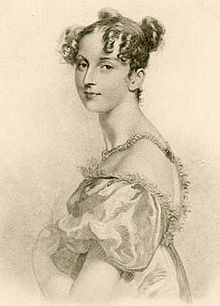Princess Dorothea von Lieven
(December 17, 1785 - January 27, 1857)
|
Princess Dorothea von Lieven née Benckendorff was a Baltic German noblewoman and wife of Prince Khristofor Andreyevich Lieven, Russian ambassador to London, 1812 to 1834. She was also an influential figure among many of the diplomatic, political, and social circles of 19th-century Europe.This was a really interesting page and I highly suggest you take a read of her full biography. She seems like she was an amazing woman to know!
In 1810 her husband was appointed minister to Berlin. When Tsar Alexander I appointed Count Lieven ambassador to Great Britain in 1812, Dorothea von Lieven used her intelligence, charisma, and social skills to make herself a leader of London's politically infused society, thereby contributing materially to the success of her husband's embassy.
In London, Princess Lieven cultivated friendships with the foremost statesmen of her day. As well, she and Austrian Chancellor Prince Klemens Lothar Wenzel von Metternich had a notorious liaison. She was also reputed to have had an affair with Lord Palmerston, although there is no firm proof of this.[3] She was a close friend of Lord Castlereagh, and was one of the first people to voice concerns about his increasingly strange behaviour in the weeks leading up to his suicide. Lord Grey confided in her, even sharing with her his intense grief on the death of his grandson Charles in 1831; on the other hand she admitted that the details of what became the Reform Act 1832 came as a complete surprise to her, which may be a sign that Grey despite their friendship did not entirely trust her.
In England's vibrant political environment, the Princess discovered in herself a flair for politics. She also became a leader of society; invitations to her house were the most sought after and she was the first foreigner to be elected a patroness of Almack's, London's most exclusive social club, where von Lieven introduced the waltz to England. Despite her apparently frivolous nature she had a deep religious faith, and far in advance of her time seems to have disapproved of the death penalty. She was something of a snob, and made many enemies due to her haughty manner towards those she regarded as social inferiors. Dorothea von Lieven's position as the Russian ambassadress, her friendships, and her political acumen established her as a major political force. Though outwardly deferential to her husband she was by far the stronger character and soon completely eclipsed him: London society jokingly called them "the two Russian ambassadors".
Princess Lieven "succeeded in inspiring a confidence" with prominent men "until now unknown in the annals of England", wrote Russian foreign minister Count Nesselrode. Her friendships with George IV, Prince Metternich, Lord Palmerston, the Duke of Wellington, George Canning, Count Nesselrode, Lord Grey, and François Guizot gave Dorothea Lieven the opportunity to exercise authority in the diplomatic councils of Great Britain, France, and Russia. She was a political force, a position reached by no other contemporary female.
The Princess participated, either directly or indirectly, in every major diplomatic event between 1812 and 1857. She knew "everyone in the Courts and cabinets for thirty or forty years"; she "knew all the secret annals of diplomacy", wrote a French diplomat. Lord Palmerston seems to have resented her interference, writing " a busy woman must do harm because she can do no good."
Hence, Princess Lieven's politically focused correspondence with luminaries across Europe is primary source material for students of the period. Parts of the Princess's diary, her correspondence with Lords Aberdeen and Grey, François Guizot, Prince Metternich, and her letters from London to her brother Count Alexander von Benckendorff, have been published. There is a vast trove of unpublished material in the British Library, and a scattering of unpublished correspondence in several Continental archives.
"She is a stateswoman", said the Austrian ambassador to France, "and a great lady in all the vicissitudes of life."


No comments:
Post a Comment
Hi Janeites! Thank you for visiting our website. We invite you to comment on our content. Of course, Lady Catherine would believe us all to behave like gentlemen and ladies, so please let us not disappoint her.
Also, please leave comments in English, as only Lady Catherine, had she ever studied a foreign language, would be a great profient enough to read such comments. (Merci! Arigato! Gracias!)